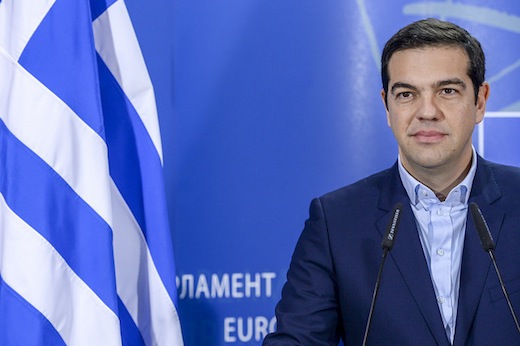
ATHENS, Greece (AP) – Greece’s new Prime Minister Alexis Tsipras set his leftist government on a collision course with Greece’s creditors Sunday, proclaiming an end to the era of austerity and “five years of bailout barbarity.” [Greece’s creditors are European and international banks and financial institutions, mainly the European Commission, the European Central Bank and the International Monetary Fund, often called the “troika.”]
Tsipras presented his government’s policy statement to Greek lawmakers which included, as he had forewarned, all the promises made by his radical left party, Syriza, in its manifesto before last month’s election.
The government “has taken the irrevocable decision to stick fully to its pre-election commitments,” Tsipras said, indicating that he would not compromise on his party’s positions.
By demanding a “bridge agreement” that would give Greece and its creditors time to negotiate a new debt deal much more favorable to the country by June, Tsipras appeared to stick to an approach that got short shrift from European Union partners in a series of meetings that Tsipras and his finance minister had with European officials this past week.
“If our (EU) partners are willing, we can agree (on a bridge agreement) tomorrow morning,” Tsipras said.
But this would mean the rest of the EU abandoning its declared policies and giving in to Syriza’s demands.
“The (bailout deal) has been abolished by popular mandate,” Tsipras said, referring to the two deals that have kept debt-ridden-Greece solvent and provided a historically unprecedented 240 billion euros in assistance.
This aid also went with austerity policies that shrank Greece’s economy by a quarter and resulted in record unemployment, with more than a quarter of the workforce jobless.
Having come to power as a result of a popular backlash against these measures, Tsipras geared his speech completely toward a domestic audience, insisting that it is the EU that must return to its “founding principles of solidarity, social cohesion, growth and democracy.”
“We declare categorically, we will not negotiate our history. We will not negotiate this people’s pride and dignity,” said an emotional Tsipras as he concluded his speech.
The current bailout deal runs until the end of February, but Tsipras said the government is “not entitled to ask for an extension,” while blasting the previous government for purposely rejecting an EU proposal to extend the deal to June so that a Syriza-led government would face tight deadlines.
“They burned the crops and blew the bridges,” Tsipras said of the previous conservative-socialist coalition government.
Syriza’s own program includes measures to provide relief for the poor, such as free meals, free electricity and free health care; relief for the middle class by abolishing an unpopular property tax and replacing it with a tax on very large property; and sops to his supporters, such as the abolition of university reform and a re-establishment of the state TV and radio broadcaster that was shut down in 2013 and replaced by a slimmed-down version. But a pledge to raise the minimum wage to pre-crisis levels, once promised as the first measure to be implemented by the government, will be done in two stages and not realized until 2016.
Tsipras insisted that his government’s budgets would be balanced, save for the debt servicing needs. On the debt, while his original demand for a minimum 60 per cent “haircut,” or write-off, has been rejected by Greece’s creditors, he has presented other proposals, such as issuance of low-interest “perpetual bonds,” maturity extensions and deferrals of payments that would have the same effect. He said the EU should have no problem accepting his pledges to tackle corruption and tax evasion and reform the state administration.
Greek lawmakers will debate the policy statement and hold a confidence vote at midnight Tuesday.
Greece faces three crucial European Union meetings in the coming days: an emergency meeting of Eurozone finance ministers on Wednesday, a summit of EU leaders Thursday, and another Eurozone finance ministers meeting on Feb. 16. It has been given a virtual ultimatum to present a program compatible with the bailout deal by that latter meeting; the European Central Bank has applied additional pressure by refusing to accept Greek bonds as collateral after Feb. 11, forcing Greek banks to seek funds from a, more expensive, emergency liquidity mechanism.
Photo: New Greek Prime Minister Alexis Tsipras visited the European Parliament on the Feb. 4, where he was welcomed by EP President Martin Schulz. After the meeting Schulz said: “Mr Tsipras is battling for European cooperation, not only seeking a solution for Greece. He has my full support.” He also stressed the need for a framework for “constructive dialogue and solutions.”(© European Union 2014 – European Parliament. Attribution-NonCommercial-NoDerivs Creative Commons license.)

MOST POPULAR TODAY

High Court essentially bans demonstrations, freedom of assembly in Deep South

Zionist organizations leading campaign to stop ceasefire resolutions in D.C. area

U.S. imperialism’s ‘ironclad’ support for Israel increases fascist danger at home

UN warns that Israel is still blocking humanitarian aid to Gaza







Comments